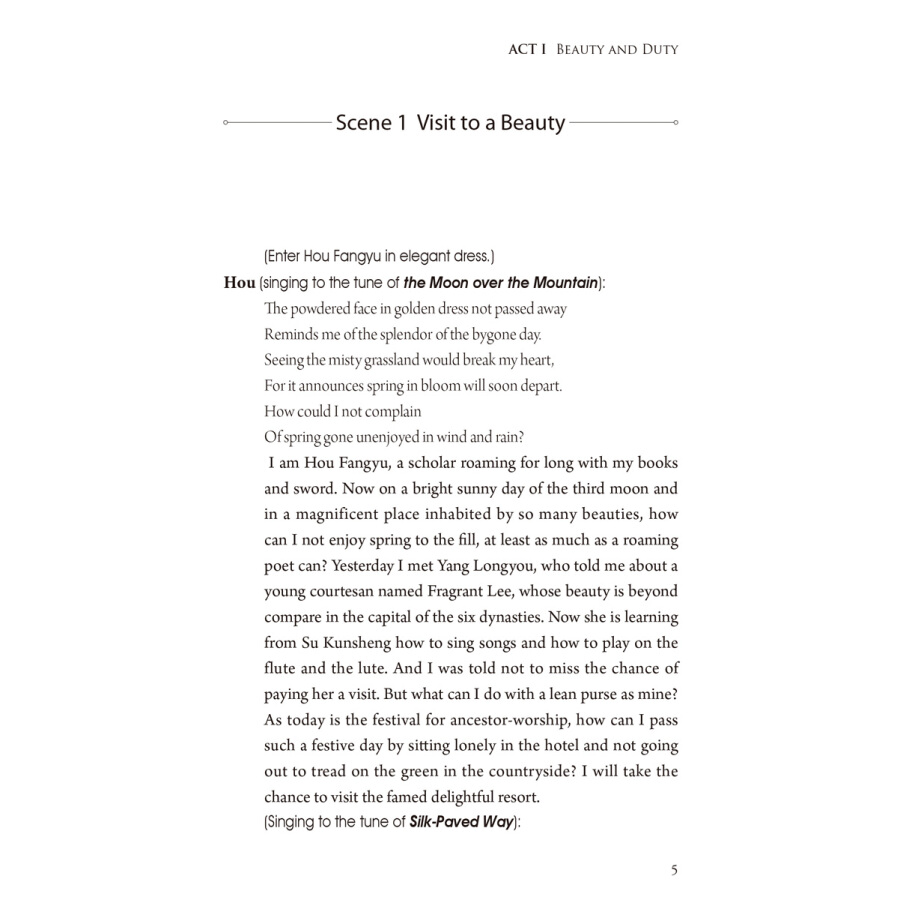
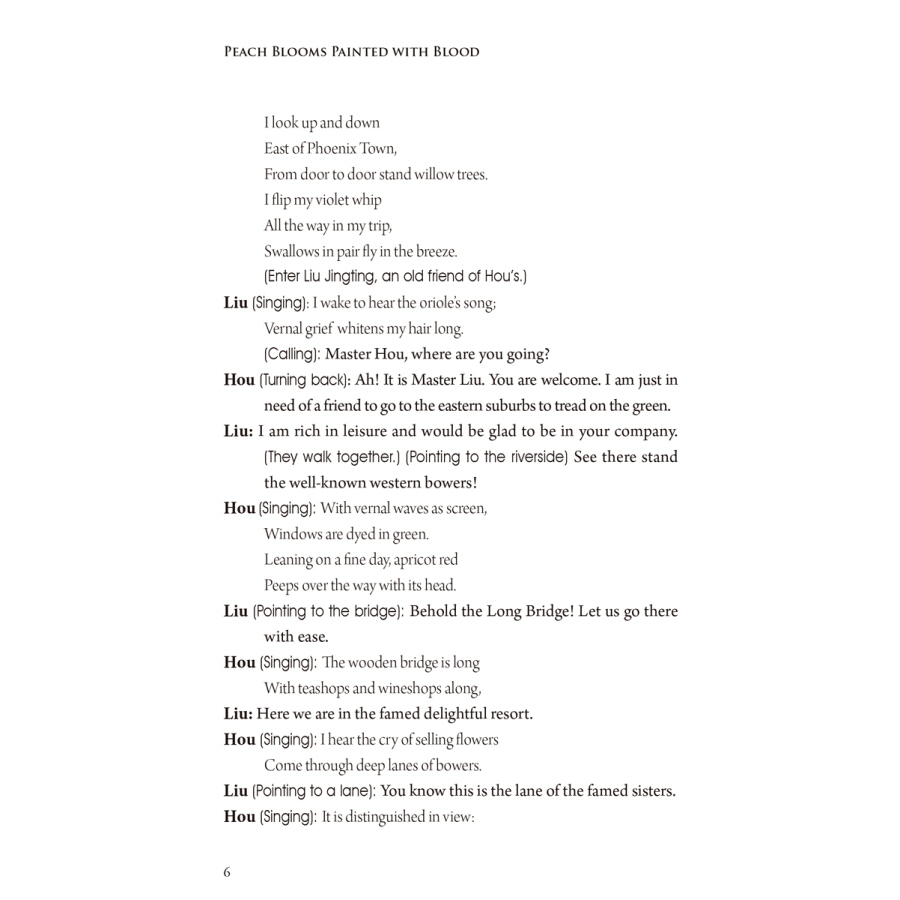
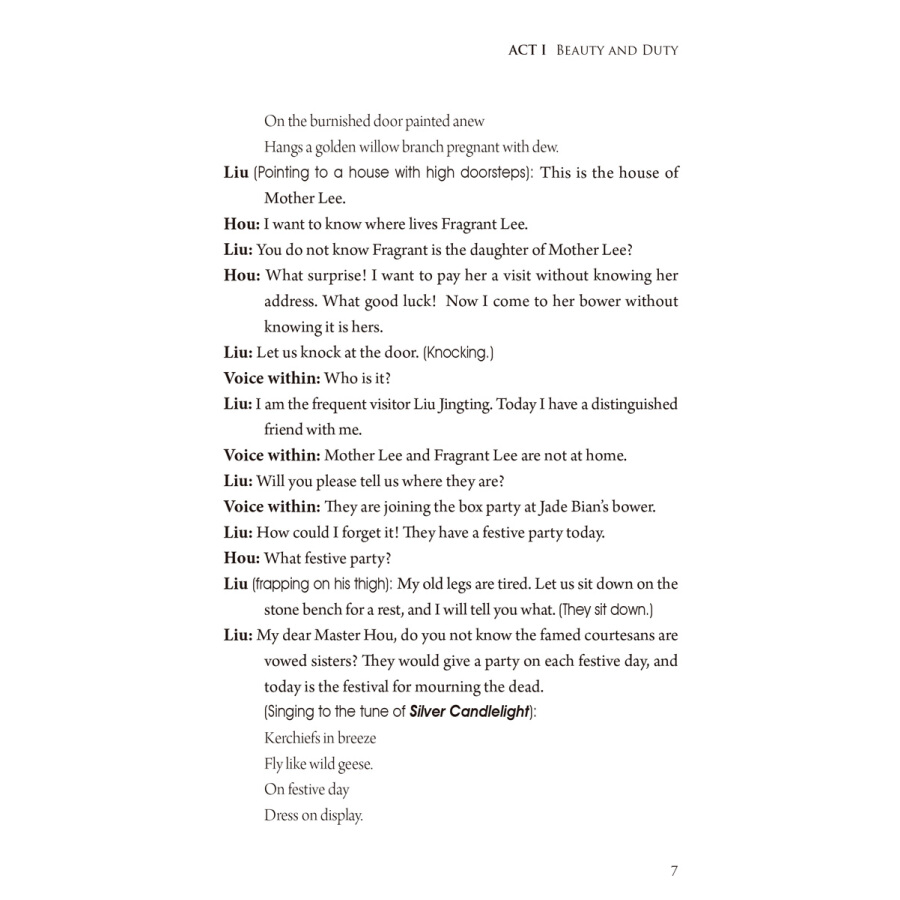
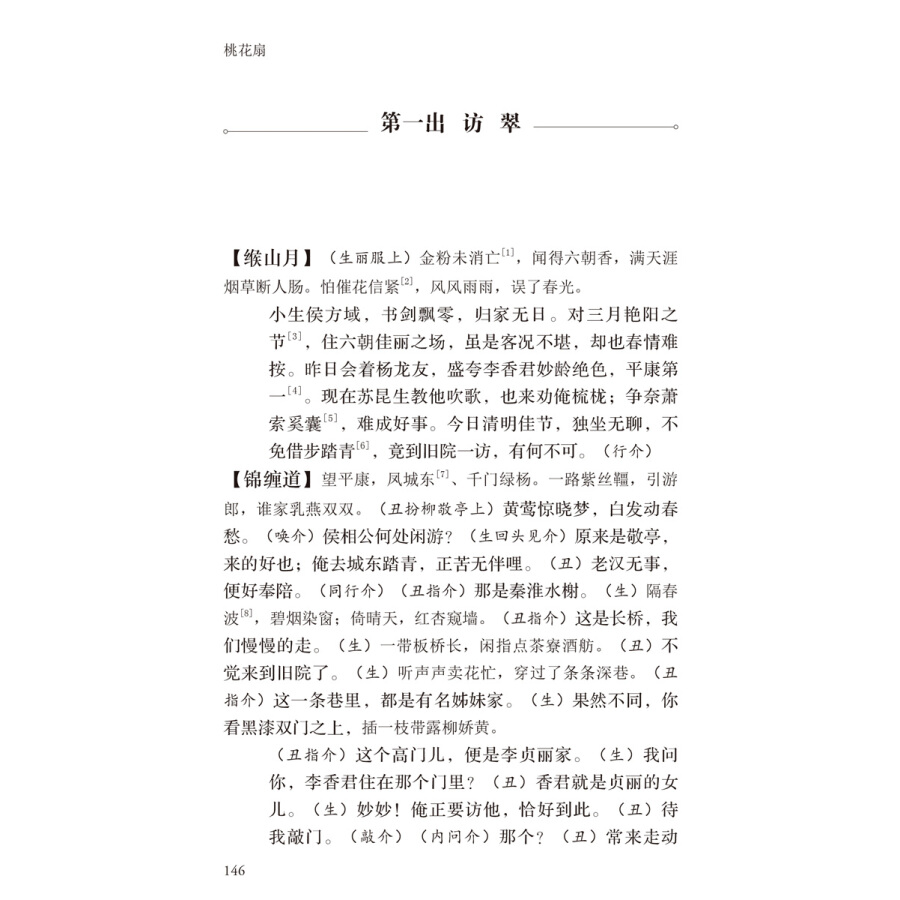
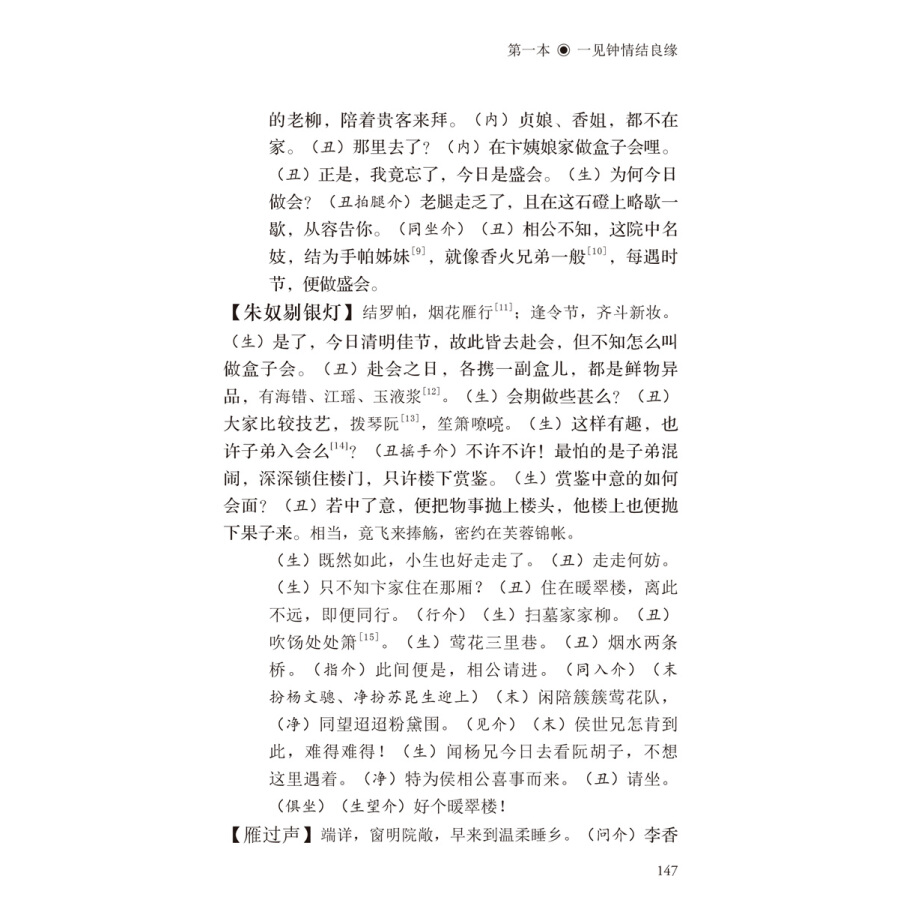
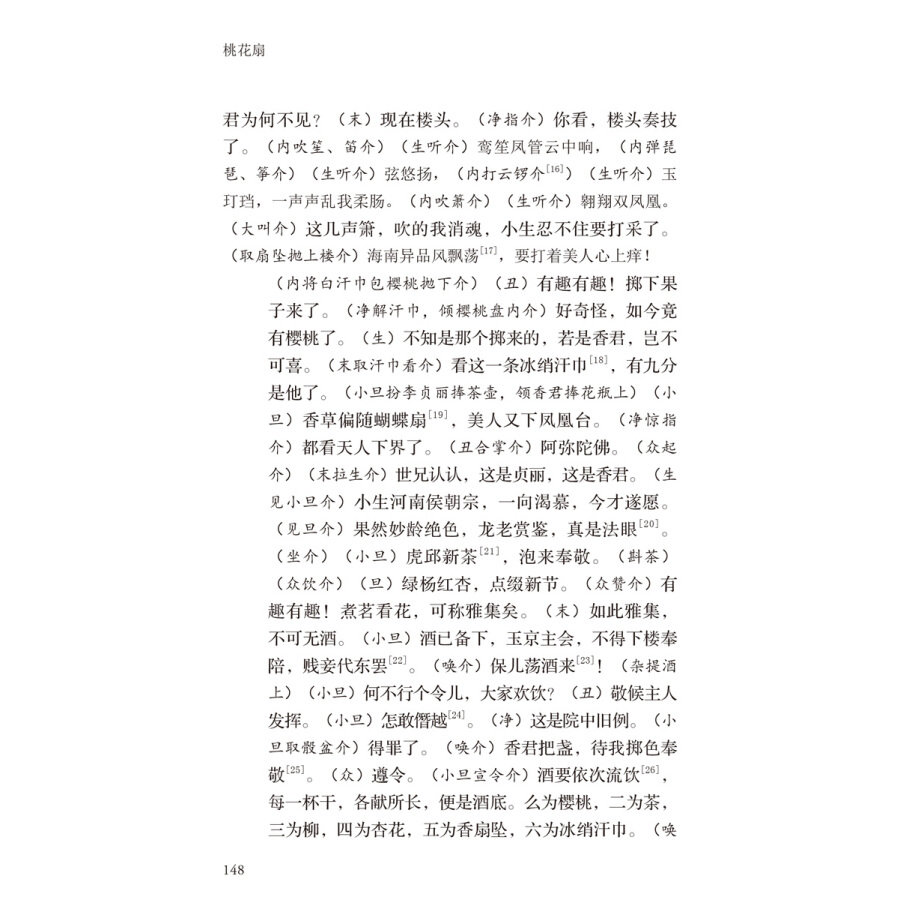
Scene 3 The Camp Gate
(Enter two soldiers.)
First Soldier (Singing):
Killing the foe, we take the things they leave;
We occupy their houses but none grieve.
Officers eat from the stores a great deal;
Soldiers have from dawn till dusk their meal.
Second Soldier: Now we do not sing like that.
First Soldier: How do you sing now?
Second Soldier (Singing):
We can take nothing the foe leave;
People’s empty houses make us grieve.
Officers eat nothing from the store;
Soldiers can have their meals no more.
First Soldier: If what you sing is true, we poor soldiers would die of hunger.
Second Soldier: That is almost true.
First Soldier: Last time when we shouted for food supply, our general promised to station us around the food stores in the vicinity of the Southern Capital. But now days have passed without further information. Could our general have changed his mind?
Second Soldier: If he changes his mind, we may raise another tumult.
First Soldier: Do not talk about tumult. We had better go to the camp gate for the daily manoeuvre. Do not forget the punishment for violation of martial law is more terrible than hunger or even death. (Exeunt.)
(Enter Liu Jingting with his baggage on the back.)
第三出 投 辕[1]
(净、副净扮二卒上)(净)杀贼拾贼囊,救民占民房,当官领官仓,一兵吃三粮。(副净)如今不是这样唱了。(净)你唱来!(副净)贼凶少弃囊,民逃剩空房,官穷不开仓,千兵无一粮。(净)这等说,我们这穷兵当真要饿死了。(副净)也差不多哩。(净)前日鼓噪之时,元帅着忙,许俺们就粮南京,这几日不见动静,想又变卦了。(副净)他变了卦,俺们依旧鼓噪,有何难哉。(净)闲话少说,且到辕门点卯,再作商量。正是 “不怕饿杀,谁肯犯法”。(俱下)
【北新水令】(丑扮柳敬亭,背包裹上)走出了空林落叶响萧萧,一丛丛芦花红蓼。倒戴着接帽[2],横跨着湛卢刀[3],白髯儿飘飘,谁认的诙谐玩世东方老[4]。
俺柳敬亭冲风冒雨,沿江行来,并不见乱兵抢粮,想是讹传了。且喜已到武昌城外,不免在这草地下打开包裹,换了靴帽,好去投书。(坐地换靴帽介)
【南步步娇】(副净、净上)晓雨城边饥乌叫,来往荒烟道,军营半里遥。(指介)风卷旌旗,鼓角缥缈,前面是辕门了,大家趱行几步。饿腹好难熬,还点三八卯[5]。
(丑起拱介)两位将爷,借问一声,那是将军辕门?(净向副净私语介)这个老儿是江北语音,不是逃兵,就是流贼。(副净)何不收拾起来,诈他几文,且买饭吃。(净)妙!(副净问介)你寻将军衙门么?(丑)正是。(净)待我送你去。(丢绳套住丑介)(丑)呵呀!怎么拿起我来了?(副净)俺们是武昌营专管巡逻的弓兵,不拿你,拿谁呀。(丑推二净倒地,指笑介)两个没眼色的花子,怪不得饿的东倒西歪的。(净)你怎晓得我们挨饿。(丑)不为你们挨饿,我为何到此?(副净)这等说来,你敢是解粮来的么?(丑)不是解粮的,是做甚的。(净)啐!我们瞎眼了,快搬行李,送老哥辕门去。(副净、净同丑行介)
【北折桂令】(丑)你看城枕着江水滔滔,鹦鹉洲阔,黄鹤楼高[6]。鸡犬寂寥,人烟惨淡,市井萧条。都只把豺狼喂饱,好江城画破图抛。满耳呼号,鼙鼓声雄,铁马嘶骄。
Preface
There are four important Chinese dramatic works written in rhyme from the 13th to the 19th century, namely, Romance of Western Bower, Dream in Peony Pavilion, Love in Long-life Hall, and Peach Blooms Painted with Blood. All these four works tell us love stories which reflect the times from Tang to Qing dynasties. Love in Long-life Hall is said to reflect the strife between love and power, Romance of Western Bower between love and honor, Dream in Peony Pavilion shows that love can revive the dead, and Peach Blooms Painted with Blood that political power can separate living lovers.
The hero of Peach Blooms Painted with Blood is Master Hou, patriotic intellectual of Ming Dynasty, and the heroine is Fragrant Lee, one of the eight famed songstresses in Jinling. They fell in love at first sight and he presented her a fan as token of love, on which he wrote the following poem:
The beauty of the Southern land
Holds you not in sleeves but in hand.
You follow her as summer fan
Brings her fragrant breeze when you can.
They were soon married. The last Ming emperor died as a result of the troubles within and without, a new emperor succeeded to the throne. As Hou did not support the new ruler, he was put in prison and Lee was forced to remarry another lord. She would prefer death to remarriage, so she dashed her head against the ground and her blood stained the fan, on which a peachblossom was painted, and that is why the fan was called peachblossom fan.